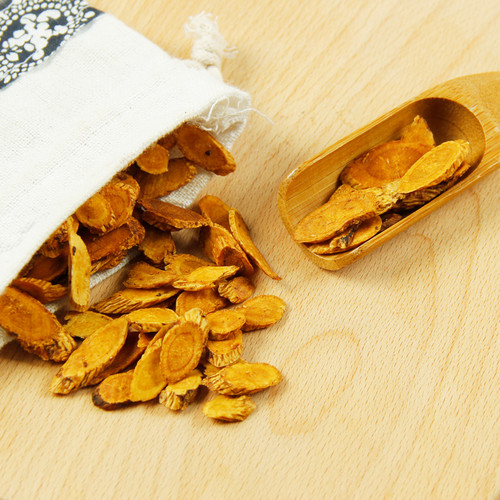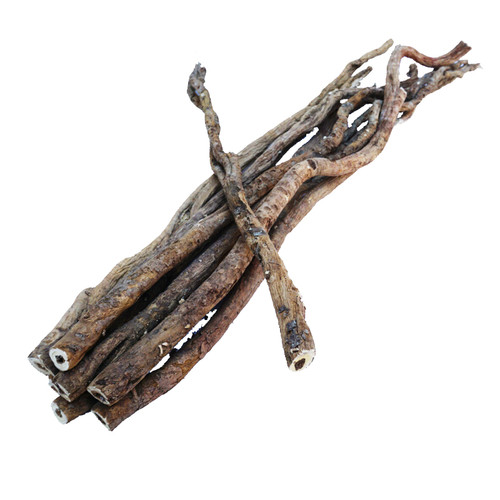Product Overview
Parts used: Dried root
TCM category: Tonic herbs for Qi Deficiency
TCM nature: Warm
TCM taste(s): Sweet
Meridian affinity: Spleen Lung
Scientific name: Astragalus membranaceus
Use of milkvetch roots (Huang Qi) in TCM
Please note that you should never self-prescribe TCM ingredients. A TCM ingredient is almost never eaten on its own but as part of a formula containing several ingredients that act together. Please consult a professional TCM practitionner, they will be best able to guide you.
Preparation: Remove impurities and smaller roots, dry and cut into sections.
Dosage: 9 - 30 grams
Main actions according to TCM*: Tonifies the Wei Qi and stops perspiration. Tonifies the Spleen Qi and the Yang Qi of the Earth Element. Tonifies the Qi and Blood. Expels pus and assists in the healing of wounds. Helps to regulate water metabolism in the body and reduce edema.
Primary conditions or symptoms for which milkvetch roots may be prescribed by TCM doctors*: Anorexia Diarrhea Rectal prolapse Abnormal uterine bleeding Albuminuria Acute nephritis Diabetes Night sweats Uterine prolapse Edema
Contraindications*: Should not be used for case of Excess or Deficiency of Yin with Heat signs and should not be used when there is Stagnation of Qi with painful obstruction.
Common TCM formulas in which milkvetch roots are used*:
For rheumatism, muscular pains and spams or lumbago combine milkvetch roots with notopterygium roots (Qiang Huo), turmeric (Jiang Huang), dong quai (Dang Gui), red peony roots (Chi Shao), saposhnikovia roots (Fang Feng), fresh ginger (Sheng Jiang), liquorice (Gan Cao) and jujube dates (Da Zao).
For Yin type boils combine milkvetch roots with dong quai (Dang Gui) and cinnamon bark (Rou Gui).
For edema with weakness combine milkvetch roots with stephania roots (Fang Ji) and atractylodes rhizomes (Bai Shu).
For Deficient Qi and Blood with symptoms of palpitations, insomnia and forgetfulness combine milkvetch roots with longans (Long Yan Rou), ginseng (Ren Shen), dong quai (Dang Gui) and jujube seeds (Suan Zao Ren).
For insufficient lactation caused by Deficient Qi and Blood combine milkvetch roots with vaccaria seeds (Wang Bu Liu Xing) and dong quai (Dang Gui).
For the treatment of prolapsed Qi with symptoms of chronic fatigue and weakness as a result of physical exertion or stress combine milkvetch roots with bupleurum roots (Chai Hu), codonopsis roots (Dang Shen), atractylodes rhizomes (Bai Shu), ginseng (Ren Shen), liquorice (Gan Cao), dong quai (Dang Gui), bugbane rhizomes (Sheng Ma) and tangerine peel (Chen Pi).
For spontaneous sweating and/or sweating that cannot be stopped combine milkvetch roots with ephedra root (Ma Huang Gen) and dong quai (Dang Gui).
For Yang and Qi deficiency with spontaneous sweating combine milkvetch roots with cornelian cherries (Shan Zhu Yu) and codonopsis roots (Dang Shen).
For prolapse of the rectum combine milkvetch roots with pomegranate peel (Shi Liu Pi) and bugbane rhizomes (Sheng Ma).
Key TCM concepts behind milkvetch roots (Huang Qi)'s properties
In Traditional Chinese Medicine (TCM), milkvetch roots are plants that belong to the 'Tonic herbs for Qi Deficiency' category. Tonic herbs are used for patterns of Deficiency, when one lacks one of the 'Four Treasures' (Qi, Blood, Yin and Yang). Qi tonics are typically sweet and they tend to enter the Spleen and Lungs because these organs are most involved with the production of Qi.
Furthermore milkvetch roots are plants that are Warm in nature. This means that milkvetch roots tend to help people who have too much "cold" in their body, although with less effect than a plant that would be Hot in nature. Balance between Yin and Yang is a key health concept in TCM. Those who have too much cold in their body are said to either have a Yin excess (because Yin is Cold in nature) or a Yang deficiency (Yang is Hot in Nature). Depending on your condition milkvetch roots can help restore a harmonious balance between Yin and Yang.
Milkvetch roots also taste Sweet. The so-called "five elements" theory in Chinese Medicine states that the taste of TCM ingredients is a key determinant of their action in the body. Sweet ingredients like milkvetch roots tend to slow down acute reactions and detoxify the body. They also have a tonic effect because they replenish Qi and Blood.
The tastes of ingredients in TCM also determine what organs and meridians they target. As such milkvetch roots are thought to target the Spleen and the Lung. In TCM the Spleen assists with digestion, blood coagulation and fluid metabolism in the body. In addition to performing respiration, the Lungs are thought to be a key part of the production chain for Qi and the body fluids that nourish the body.










